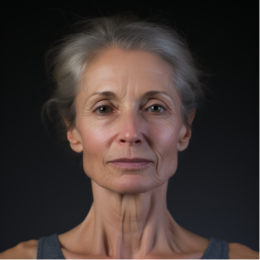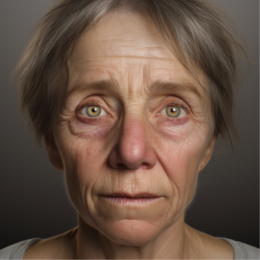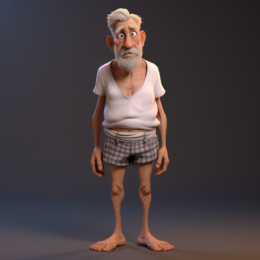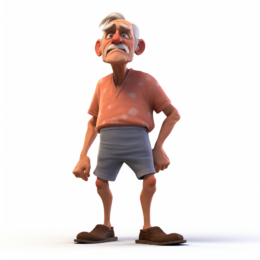Understanding Alzheimer’s: Risk Factors and Progression

We thought you might like these too:
- Understanding What Eyes Can Say About Alzheimer’s Disease
- Activities For People With Dementia: 10 Fun No-Fail Ideas
- Caring for a Loved One: 12 Important Tips for Dementia Caregivers
- Understanding the Stages of Dementia: What to Expect?
Every family has its own stories, some of which are passed down through the generations. Today, we embark on the journey of Mary, a lively character who navigates the challenges of Alzheimer’s. Like many of us, you might find Mary’s story eerily familiar. After diving into the intricate web of how one gets Alzheimer’s, I invite you to share if Mary’s experience resonates with you or reminds you of someone you know.
What is Alzheimer’s Disease?
Simply put, Alzheimer’s is a brain disease that affects memory, thinking, and behavior. It’s like trying to read a book with missing pages – you lose parts of the story. For Mary, it started with forgotten keys and misplacing her glasses. But as the disease progressed, even her loved ones became unfamiliar faces.
Progressive Nature of the Disease
Alzheimer’s disease has a stealthy progression. It begins subtly, often mistaken for typical age-related memory lapses. But with time, its effects become more pronounced and disruptive. The disease’s trajectory can be broadly categorized into three stages: mild (early-stage), moderate (middle-stage), and severe (late-stage). In the early stage, like in Mary’s case, one might forget familiar words or the location of everyday items.
As it transitions to the moderate stage, individuals may forget personal details, experience mood swings, and even become lost in familiar settings. By the time it reaches the severe stage, communication becomes a challenge, physical abilities like walking diminish, and round-the-clock care is often necessary.
The understanding of these “Alzheimer’s progression stages” is crucial not just for the patient but for families and caregivers. It equips them with the knowledge of what to expect and how best to provide support throughout the journey. For Mary and her family, recognizing these stages early on played a significant role in managing the challenges that came with them.
Statistics:
- Nearly 6 million Americans are living with Alzheimer’s.
- Every 65 seconds, someone in the U.S. develops the disease.
Impact on Cognitive Function and Daily Life
The ripple effect of Alzheimer’s on cognitive function extends far beyond mere forgetfulness. As the disease progresses, it disrupts the very essence of one’s identity and autonomy. Initially, a person might experience minor memory hiccups, such as forgetting names or misplacing objects. But as the disease advances, more complex cognitive functions are compromised. Tasks like planning a meal, managing finances, or even following a TV show become daunting challenges.
- Struggled with routine tasks like cooking.
- Felt lost in familiar places, like her childhood park.
- Became more withdrawn, sometimes not recognizing her own children.
The Role of Genetics
“How do you get Alzheimer’s?” Mary’s children often pondered. Genetics does play a role:
Statistics:
- Those with a parent or sibling with Alzheimer’s are more likely to develop it.
- Certain genes, like APOE-e4, are associated with a higher risk.
For Mary, her mother had faced a similar journey, pointing to the genetic predisposition in her family.

Age as a Primary Risk Factor
Age is the most significant risk factor. The older you get, the higher the risk:
Statistics:
- By 65, 1 in 10 people have Alzheimer’s.
- This increases to 3 in 10 for those above 85.
Like the wrinkles that mark our skin, Alzheimer’s is an unfortunate companion that can accompany old age.
Lifestyle Factors and Alzheimer’s Risk
- Diet and Exercise: Regular physical activity and a heart-healthy diet may reduce the risk.
- Heart Health: Conditions like hypertension can increase Alzheimer’s risk.
- Brain Activities: Engaging in cognitive tasks (like puzzles) may lower the risk.
Mary loved her evening walks and crossword puzzles. Could these activities have delayed the onset of her symptoms?
Quick Poll
Environmental Factors and Toxins
Some studies suggest that exposure to certain toxins might increase Alzheimer’s risk. However, solid evidence is still lacking. But imagine if Mary’s passion for pottery and the chemicals involved played a part.
The Impact of Chronic Stress on Brain Health
Stress, often dubbed the “silent killer,” has a far-reaching impact on our brain health. While short-term stress can be a natural response to challenges and might even boost cognitive function temporarily, it’s the chronic, unrelenting stress that poses significant risks.
Statistics:
- Chronic stress can lead to cognitive decline.
- High cortisol levels have been linked to Alzheimer’s.
Mary’s life wasn’t short of hardships. The loss of her husband’s financial strains—did these stresses play a part in her story?
Conclusion
Through Mary’s journey, we glimpse the complex narrative of Alzheimer’s. From genetics to lifestyle choices, many factors interplay in the story of “How do you get Alzheimer’s.” While we cannot change our genes or age, understanding the disease gives us a chance to adopt a proactive approach to brain health.
Now, let’s make this personal. Does Mary’s journey remind you of someone? Perhaps a loved one or even yourself? Share your stories, and let’s learn from each other.
PERSONAL QUESTION: WHAT’S ONE MEMORY YOU’D NEVER WANT TO FORGET?
SHARE YOUR ANSWERS, THOUGHTS, AND EMOTIONS. TOGETHER, WE CAN FORGE A SUPPORTIVE COMMUNITY, ONE STORY AT A TIME.
References
- Alzheimer’s Association. (2021). Facts and Figures.
- National Institute on Aging. (2022). Alzheimer’s Disease Genetics Fact Sheet.
- Mayo Clinic. (2021). Alzheimer’s disease – Symptoms and Causes.





